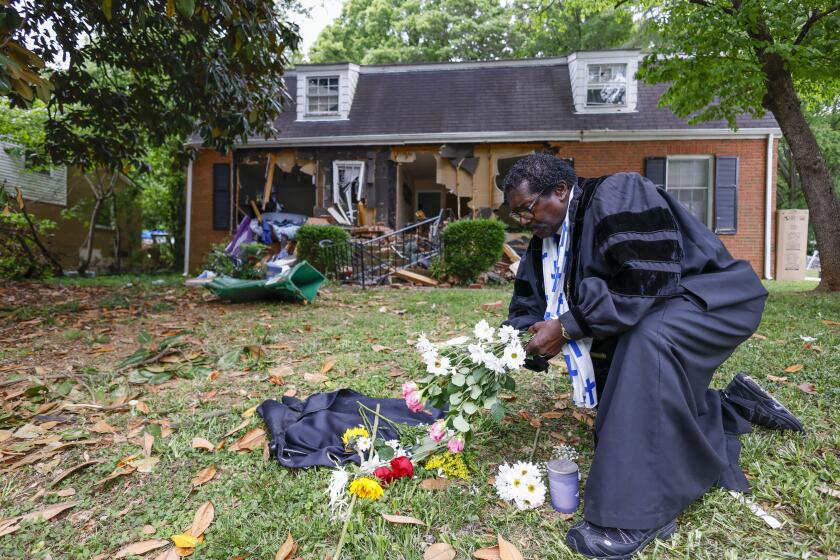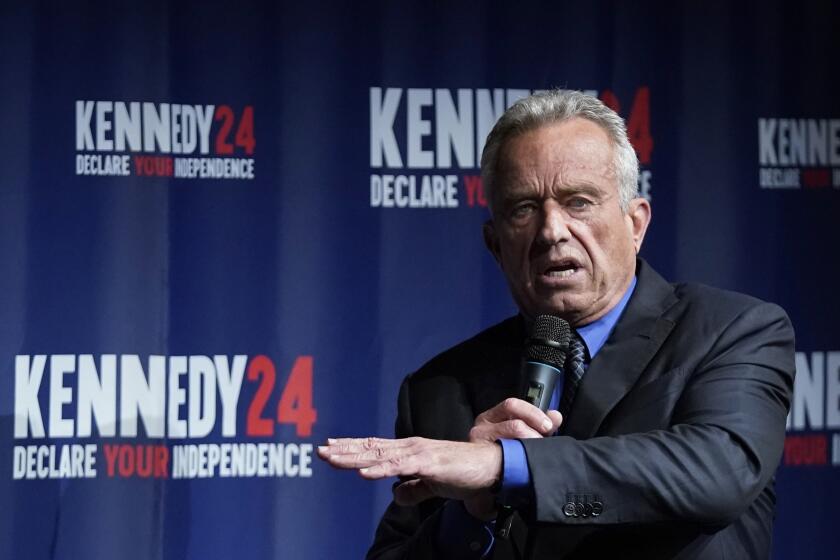Aquino Rejects $5-Billion Offer From Marcos
Philippine President Corazon Aquino has rejected an offer to allow ousted leader Ferdinand E. Marcos to return to the country in exchange for $5 billion and a pledge to work for national unity, the Philippine ambassador to the United States said Tuesday.
“The president simply said no,” said Ambassador Emmanuel Pelaez, confirming the offer made by representatives of Marcos. “It was an attempted negotiation, and we closed the door on it.”
Put in Writing
According to Pelaez, two representatives of Marcos made a specific offer of $5 billion to him at the Philippine Embassy in Washington in early July. He said the $5-billion figure was also put in writing to another intermediary involved in the discussions about Marcos’ return.
Pelaez acknowledged that he had forwarded the proposal, including the $5-billion offer, to Aquino’s executive secretary, Catalino Macaraig Jr., in Manila. He said Macaraig sent back a negative reply.
“If the money is surrendered (by Marcos), that is something else,” the ambassador said. But he said Aquino would not accept “any kind of negotiation” over Marcos’ concern.
At his home in Honolulu on Tuesday, Marcos issued a written statement confirming that he has been promising “national reconciliation” in the Philippines if he is allowed to return there but denying a report in Tuesday’s editions of The Times that he had promised $5 billion as part of the deal.
“I prefer to leave the details of the matter private for the moment on the advice of our lawyers,” Marcos said. But he added: “The story to the effect that I have offered or accepted the condition that I pay $5 billion to the present government so that I may be allowed to return to the Philippines with my family and the cases against me dropped is false.”
But that denial was blamed on Marcos’ being “desperately concerned about how his supporters will respond” to his offer of trading funds and support for the Aquino government for a chance to return to the Philippines, according to a source involved in the discussions.
The public disclosure of the $5-billion offer and its rejection will apparently make it difficult, if not impossible, for Marcos to negotiate his return to the Philippines at a time when he is the target of a grand jury investigation in the United States.
In New York City, federal prosecutors have recommended an indictment of Marcos on fraud charges stemming from his purchase of art and American real estate with money allegedly diverted from the Philippine government. Justice Department officials in Washington are now reviewing the case.
According to Pelaez, the offer of $5 billion was made to him early this month by Jay Hoffman, a Tarzana, Calif., public relations executive, and A. James Gregor, a UC Berkeley political science professor. He said the two men came to see him at the Philippine Embassy.
“They said that they were authorized by President Marcos to negotiate for him, that he was prepared to provide $5 billion,” the ambassador said.
Several other sources involved in the discussions also confirmed the $5-billion offer. Hoffman has made no official comment on the $5-billion offer. On Monday, Gregor told The Times that representatives for Marcos had entered into talks with Philippine officials, including Pelaez, seeking a deal in which Marcos would pay $5 billion in exchange for the right to return to his home province of Ilocos Norte.
‘Sometimes Carry Messages’
Gregor, the author of several books on the Philippines and Southeast Asia, said Monday that he was not a direct party to the negotiations over Marcos’ future, but explained in a telephone interview Monday that “I sometimes carry messages back and forth.”
The Philippine ambassador said he is personally opposed to the offer and said so to Hoffman and Gregor.
“I said that ($5 billion) was pie in the sky. I didn’t believe it,” Pelaez said. “. . . From a moral standpoint, I felt a sense of revulsion.” He said he told the two men that there were pending cases against Marcos both in Switzerland and in the United States, and that the Philippine government did not want to do anything to prejudice those cases.
However, the ambassador admitted that he passed on the offer. “I sent a telex to Manila, outlining my conversation with Hoffman and Gregor, and I stated my stand, that the strength of Cory Aquino is that she is on high moral ground,” he said.
‘Partially Accurate’
In his written statement in Honolulu, Marcos said that the story in Tuesday’s editions of The Times about his efforts to negotiate a return was “partially accurate.”
“The story accurately identified efforts by my representative, Mr. Jay Hoffman, to discuss in Washington with well-known friends of the Aquino government this proposal (for his return),” Marcos said.
Marcos said the story also “recognized correctly that part of this recommendation would involve the understanding that I and my family will stay out of politics. But it was inaccurate in stating that I hope for a governorship for my son, Ferdinand Jr.” And he said he had not offered $5 billion to the Philippine government.
Gregor said Monday that Marcos’ representatives had suggested distributing the $5 billion not through the Aquino government, but through some other agency such as the Roman Catholic Church.
Pelaez said that in addition to the verbal offer to him, a letter from Marcos offering $5 billion was sent to Allen Weinstein of the Center for Democracy in Washington.
According to other sources, Weinstein received two letters. One was from Marcos to Aquino and did not mention a $5-billion figure. The other, sent from Marcos to Weinstein, did mention the $5 billion. The sources said Weinstein forwarded that second letter to Aquino’s brother, Jose (Peping) Cojuangco.
Weinstein would not confirm or deny this report.
More to Read
Start your day right
Sign up for Essential California for news, features and recommendations from the L.A. Times and beyond in your inbox six days a week.
You may occasionally receive promotional content from the Los Angeles Times.






